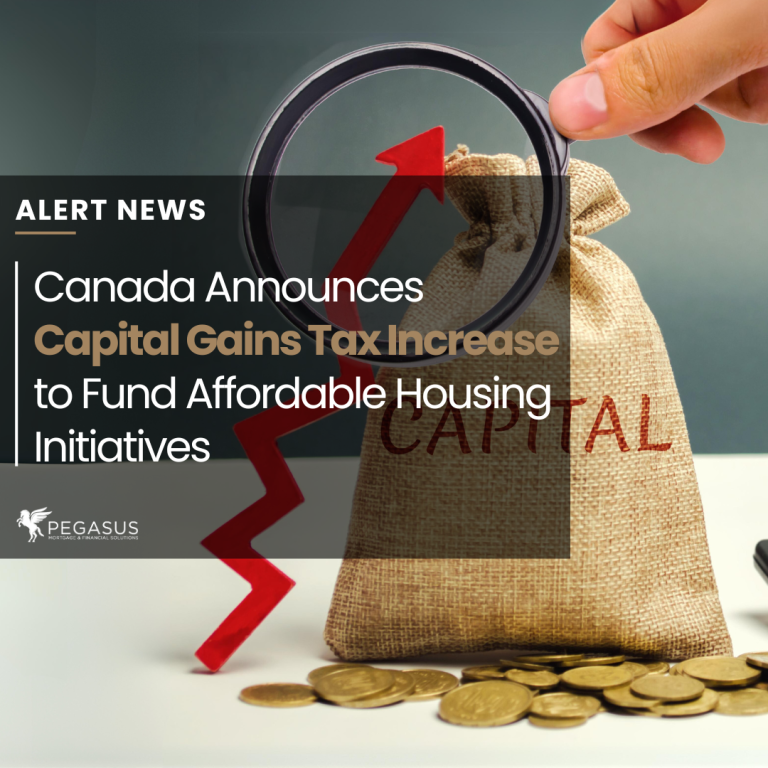Canada Is Going To Increase Capital Gains Taxes On Corporations And High-Net-Worth Individuals To Finance Tens Of Billions Of Additional Expenditures On Affordable Housing And Youth Development.
According to Finance Minister Chrystia Freeland, the government would tax Canadian businesses on two-thirds of their capital gains, up from half presently. This move will also affect individual taxpayers if their annual gains exceed C$250,000 ($181,000); nevertheless, they will still be allowed to sell their homes for a tax-free benefit. Employment income is subject to taxation for Canadians. However, they only pay taxes on fifty percent of their capital gains—that is, the profit typically realized upon selling an asset, such as stocks. This is the capital gains tax advantage, and Canada has the biggest of these advantages out of all the G7 nations.
In prepared remarks, Freeland told members of parliament that raising the tax rate on investment gains was just “asking those who are benefiting from the winner-takes-all economy to pay a little bit more” and that the goal of Canada’s tax system is to tackle “structural inequality.”
Opinion polls indicate that Prime Minister Justin Trudeau’s administration is losing support from younger voters who are fed up with the hefty cost of housing. Since he assumed office, the benchmark home price in Canada has increased by almost 60%, and apartment rentals have also surged. As a result, the government has had to implement initiatives to try and speed up building construction and ease the financial crunch.
In summary, Freeland’s 2018 budget demonstrates how the government is managing increased borrowing costs, spending demands, and its resolve to manage the deficit, which is predicted to total CAD $39.8 billion this fiscal year. To help with the cost, Trudeau and Freeland are now looking to Canada’s wealthiest individuals and businesses.
Canada’s capital-gains inclusion rate has not been this high in decades. The increase is expected to bring in CAD $6.9 billion for the government in the current fiscal year, partly because some corporations and investors will hurry to sell before the June 25 deadline to avoid paying the higher tax rate.
Alberta Central’s senior economist, Charles St. Arnaud, said, ” It may reduce the incentive for companies to invest.” “The tax changes may have an effect on how businesses perceive Canada, even though they are marginal.”
Entrepreneurs are excluded from some capital gains tax regulations, and individual investors may be able to postpone or avoid paying taxes on their investments if they store them in tax-sheltered accounts.
Assuming a corporation tax rate of 15%, the shift suggests that a business selling an asset for a gain of CAD $10 million would pay around CAD $1 million in capital gains tax under the new rate, which is almost CAD $250,000 more than it does now.
According to government projections, the capital-gains shift may bring in CAD $19.4 billion in revenue over a five-year period, with corporations accounting for around 55% of that amount.
Freeland maintained that the choice was reasonable despite this. According to PWC, corporate capital gains are taxed at the same rate as regular income in many countries, including many European countries.
Higher Growth
Based on the latest budget predictions, the government has increased program expenditure by nearly CAD $56 billion over a five-year period since last November. The funding is primarily intended to support the development of AI (artificial intelligence), defence, and housing supply. Over the same time frame, public debt costs are anticipated to increase by almost CAD $11 billion.
Robert Asselin, former advisor to Canadian prime ministers, critiqued the budget as a “tax-and-spend” approach, citing unprecedented spending levels. He emphasized concerns about lagging productivity and the need for increased investments in the economy, suggesting the timing might not be optimal.
The economy looks considerably stronger this year than most experts had predicted in late 2023, and Freeland’s budget contemplates a gentle landing. The most recent predictions indicate that nominal GDP growth will increase from 2.5% to 3.8% in 2024, increasing tax revenue in the long term.
The finance minister said that she will honour her pledge to keep deficits in check for the current and upcoming fiscal years, keeping them at about CAD $40 billion. 2026–2027, the deficit would shrink to CAD $31 billion, or around 1% of GDP.
With minimal change from last autumn, Canada’s debt-to-GDP ratio is predicted to be 42% in fiscal year 2024–2025 and reach 39% in 2029. There is no deadline in Tuesday’s budget for returning to a balanced budget.
Financing Needs
According to the government’s borrowing strategy, it will borrow CAD $228 billion in the current fiscal year—a 12% increase—by auctioning off CAD $60 billion worth of five- and ten-year bonds.
Dominique Lapointe, a macroeconomic strategist at Manulife Investment Management, stated, “We’ve seen growing investor appetite for a long duration, and the yield curve remains deeply inverted.” “That favours the government’s decision to keep issuing heavily at the longer end.” Tuesday’s closing price of Canada’s 10-year bond was 3.731%, which is almost 48 basis points less than the benchmark two-year bond.
When Trudeau took office in 2015, he promised to run small deficits to fund investments in public works. The deficits have persisted, and during the COVID-19 epidemic, his administration ran up Canada’s worst deficit ever.
The Bottom Line
Public and political reactions to the tax increase vary. Many Canadians support it as a step toward addressing inequality and funding crucial programs like affordable housing and youth development. However, some experts on public policy, like Robert Asselin from the Business Council of Canada, worry about excessive spending and its impact on corporate investments. Charles St. Arnaud from Alberta Central also warns that the tax changes might deter business investments.


